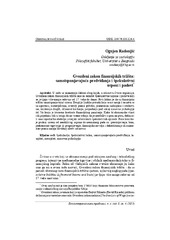Приказ основних података о документу
Gvozdeni zakon finansijskih tržišta - samoispunjavajuća predviđanja i špekulativni usponi i padovi
The iron law of financial markets: Self-fulfilling prophecies and speculative booms and busts
| dc.creator | Radonjić, Ognjen | |
| dc.date.accessioned | 2021-10-12T11:47:04Z | |
| dc.date.available | 2021-10-12T11:47:04Z | |
| dc.date.issued | 2013 | |
| dc.identifier.issn | 0353-1589 | |
| dc.identifier.uri | http://reff.f.bg.ac.rs/handle/123456789/1656 | |
| dc.description.abstract | U radu se razmatraju faktori zbog kojih, u odsustvu čvrste regulacije, Gvozdeni zakon finansijskih tržišta ima za rezultat špekulativne uspone i padove koji se javljaju više-manje redovno od 17. veka do danas. Prvi faktor je da su finansijska tržišta samoispunjavajuć sistem. Drugi je ljudska priroda koja se ne menja i zasniva se na egoizmu, materijalizmu, averziji prema gubitku, preteranim nadanjima i strahovima, imitiranju drugih, sklonosti kockanju, potpadanju pod uticaj masovne psihologije itd. Na kraju je izuzetna kratkoća finansijskog pamćenja. Kako bi ekonomske vlasti i/ili pojedinci bili u stanju da na vreme otkriju da je neodrživi uspon na putu, definisali smo zajednička obeležja istorijski zabeleženih špekulativnih epizoda. Faze kroz koje prolazi sistem od neodrživog uspona do neumitnog pada su: prestrojavanje, bum, prekomerno trgovanje ili pregrejavanje, finansijska nevolja i dekreditiranje ili animozitet prema manje likvidnoj aktivi od novca. | sr |
| dc.description.abstract | This paper discusses the factors which, in the absence of strong financial regulation, sustain the Iron Law of the Financial Markets asserting that speculative booms and busts occur more or less regularly from 17 century to the present. The first factor is that financial markets are self-fulfilling system. The second is that human nature does not change and is based on egoism, materialism, loss aversion, exaggerated hopes and fears, emulation, propensity to gamble, herd behavior and so on. Lastly, there is the extreme brevity of the financial memory. In order to enable economic authorities and/or individuals to detect timely that the unsustainable boom is under the way, we have identified the common features of historically recorded speculative episodes. Stages through which the system passes on its way from unsustainable rise to inevitable fall are: displacement, boom, overtrading, financial distress and discredit or revulsion. | en |
| dc.publisher | Univerzitet u Beogradu - Filozofski fakultet - Odeljenje za etnologiju i antropologiju, Beograd | |
| dc.relation | info:eu-repo/grantAgreement/MESTD/Basic Research (BR or ON)/179035/RS// | |
| dc.rights | openAccess | |
| dc.rights.uri | https://creativecommons.org/licenses/by/4.0/ | |
| dc.source | Etnoantropološki problemi | |
| dc.subject | špekulativni balon | sr |
| dc.subject | špekulacije | sr |
| dc.subject | samoispunjavajuća predviđanja | sr |
| dc.subject | masovna psihologija | sr |
| dc.subject | insajderi | sr |
| dc.subject | autsajderi | sr |
| dc.subject | speculative bubble | en |
| dc.subject | speculation | en |
| dc.subject | self-fulfilling prophecies | en |
| dc.subject | outsiders | en |
| dc.subject | mass psychology | en |
| dc.subject | insiders | en |
| dc.title | Gvozdeni zakon finansijskih tržišta - samoispunjavajuća predviđanja i špekulativni usponi i padovi | sr |
| dc.title | The iron law of financial markets: Self-fulfilling prophecies and speculative booms and busts | en |
| dc.type | article | |
| dc.rights.license | BY | |
| dc.citation.epage | 1136 | |
| dc.citation.issue | 4 | |
| dc.citation.other | 8(4): 1111-1136 | |
| dc.citation.rank | M24 | |
| dc.citation.spage | 1111 | |
| dc.citation.volume | 8 | |
| dc.identifier.doi | 10.21301/eap.v8i4.11 | |
| dc.identifier.fulltext | http://reff.f.bg.ac.rs/bitstream/id/552/1653.pdf | |
| dc.type.version | publishedVersion |

